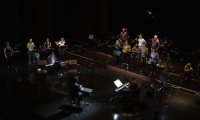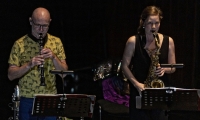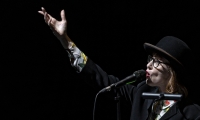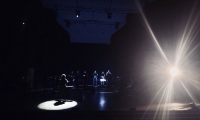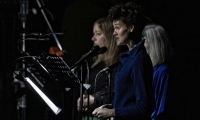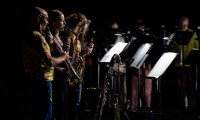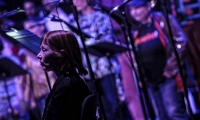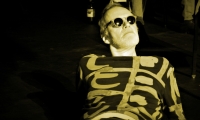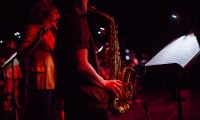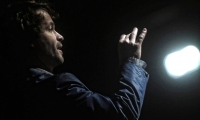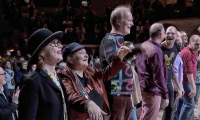Ictus,
Collegium Vocale Gent
Suzanne Vega
Duration: 200 minutes
 NEW CD!
NEW CD!
Digital album on BandCamp
Liner notes (Eng, Nl, Fr) and full credits
Archive
CREDITS
Music Philip Glass
Opera in four acts in concert version
based on a concept by
Robert Wilson and Philip Glass
Texts Christopher Knowles,
Samuel M. Johnson and Lucinda Childs
Narrator Suzanne Vega

Conductor Tom De Cock
Assistant conductor Dirk Descheemaeker
Choir Master Maria van Nieukerken

Original scenographic concept by Germaine Kruip
Costume Anne-Catherine Kunz
Production Pieter Nys
COLLEGIUM VOCALE GENT
++ = soloist
Sopranos
Joowon Chung
Malena Napal
Elisabeth Rapp++
Charlotte Schoeters

Altos
Marlen Herzog
Laura Kriese
Julia Spies

Tenors
Peter di Toro
Thomas Köll

Basses
Philipp Kaven
Bart Vandewege
ICTUS
Violin
Igor Semenoff
Flute an d piccolo
Chryssi Dimitriou
Bass clarinet
Dirk Descheemaeker
Alto and soprano saxophones
Nele Tiebout
Soprano saxophone
Asagi Ito
Keyboards
Jean-Luc Plouvier
Brecht Valckenaers
Sound
Alexandre Fostier
Sound assistant
Antoine Delagoutte
Production
Pieter Nys
MOVEMENTS
Knee play 1
Train 1
Trial 1
Knee Play 2
Dance 1
Night Train
Knee Play 3
Trial 2/Prison
Dance 2
Knee Play 4
Building
Bed
Spaceship
Knee Play 5
CONTACT
FLYER
High-resolution visuals
PRODUCTION
Ictus & Collegium Vocale Gent
COPRODUCTION
Concertgebouw Brugge
With the support of Tax Shelter of the Belgian Federal Government (Version 2022)
©Dunvagen Music Publishers Inc. Used by permission.
Other tags: kaaitheater, desingel
© Jorge Carmona – Gulbenkian Música
© Jorge Carmona – Gulbenkian Música
© Jorge Carmona – Gulbenkian Música
© Jorge Carmona – Gulbenkian Música
©Jan Van den Borre
© Jorge Carmona – Gulbenkian Música
©Maxime Fauconnier
©Piero Tauro, RomaEuropa
©Maxime Fauconnier
©Maxime Fauconnier
©Piero Tauro, RomaEuropa
©Maxime Fauconnier
©Cécile Pilorger
©Maxime Fauconnier
©Maxime Fauconnier
©Piero Tauro, RomaEuropa
PRESS REVIEW
« An incalculable vertigo. » (Corriere della Serra, ROMA)
« Something magical happened in Rotterdam [...] Sublime experience »
(Theaterkrant, NETHERLANDS)
«At 8 o'clock sharp, almost unexpectedly, the numerical melopea that opens the opera began. From there everything happened as in one breath.» (El País, SPAIN )
« There is no doubt that this concert belongs to that select group of concerts chosen to be remembered and told. [...] We can say: we were there » (Ritmo.es)
« The radical and pure version of extraordinary Ictus Ensemble, Collegium Vocale Gent and Suzanne Vega led us to a deep concentration that enabled this new state of consciousness, what the Sanskrit called Dharana. » (El Punt Avui, BARCELONA)
« An exhaustion battle, an incredible tour-de-force [...] Suzanne Vega gave it a wonderful musical charge [...] Three memorable hours. » (Eindhovens Dagblad, NETHERLANDS)
« It has been so long since I left a theater with the conviction of having lived a crucial experience in my life as a music lover. » (Platea Magazine, BILBAO)
« The musicians on stage really outdid themselves, becoming Marvel or DC Comics figures emerging from the sand and revealing music as a special power. » (Internazionale, ROMA)
« Chemically pure. [...] We witness a total success in our eyes as the minimalist spirit of the work is perfectly captured, in a different way from what Wilson and Childs proposed. » (ForumOpera.com)
« An energetic black hole » (El Periodico, BARCELONA)
« As every time they engage with a repertoire work, Ictus Ensemble puts its special stamp on it by proposing a real new reading, rewarded by a prolonged standing ovation at the end of the performance. » (ResMusica.com)

An open space and an Einsteinian time dilation for this very unusual concert:
200 minutes of rhythmic high-speed micro-surgery, contrasting dramatically with the text that is whispered into the mic.
We will perform this sensational score, which dates from 1976, – from Philip Glass’s vicious experimental period,
both very radical and very poppy – with Collegium Vocale Gent (choruses) and Suzanne Vega, who is even more charming thirty years after Tom’s Diner, as the narrator, and who takes on all the roles in this opera.
Belgian and European tour.
PRESENTATION AND CONCEPT
This concert version of Einstein on the Beach by Philip Glass is a collaboration between Suzanne Vega, Ictus Ensemble and Collegium Vocale Gent. It presents a sheer musical approach to the full score of the legendary Glass/Wilson opera where the virtuosic instrumental, singing parts and crystalline structure of the piece are enhanced by a site-specific approach.
The focus of this production is the musical score itself and the musical sound of the libretto. We opt for a long-stretched performance (very close to the full score composed for the actual opera). In this way we want to create a minimalistic sound-bath of more than 3 hours length that reconnects to the freshness and radicality of early minimalism. The door of the concert hall will be kept open throughout the performance (the audience is free to wander in and out).
It is the music making itself that will be exposed. The physical and mental challenge of making 200 minutes of music. We will show musicians at work. In a shared time and space with the audience, structured by the music, they will perform different parts from different positions on stage, share the audience view when not playing, surround them or play frontal, thus transforming the concert hall in a visual and auditive surrounding environment.
VOICE AND TEXTS
Suzanne Vega provides a personal reading of the original abstract libretto. Widely known for her chart toppings tracks from the 1980s such as Tom’s Diner and Marlene On The Wall, Vega has had a long association with the New York musical and literary (it was Glass himself who arranged Fifty-Fifty Chance on Vega's third CD).
In this version, Vega acts as a multi-character narrator, bringing out the collage of voices in the texts of Christopher Knowles, Samuel M. Johnson and Lucinda Childs to provide a dramaturgical unity between all the components. .
A TOUCH OF HISTORY
Einstein on the Beach was premiered in 1976, the same year as Music for Eighteen Musicians by Steve Reich: with these two masterpieces American minimalism finally came out of the shadows of the underground scene to suddenly encounter large audiences.
The piece is written for choir and amplified ensemble, a hybrid formula between chamber ensemble and a pop band (at the time modelled on the Philip Glass Ensemble): two keyboard players playing organs and synthesizers, saxophones, flutes and clarinet. In addition to that Glass calls for a soloistic violinist, who was supposed to be the incarnation of the character of Albert Einstein himself. ‘Einstein’ still bears the traces of the radical musical experiments the composer conducted in his youth that were thought of as formal ‘etudes’ (Music in Fifths, Music in Contrary Motion,...) and is developed by accumulation of very short musical motifs that are submitted to processes of augmentation or arithmetical subtraction that dazzle the listener…
For Ictus, the whole adventure began with a decisive encounter with Germaine Kruip, an artist who studies (in her own words) “the scenography of ungraspable phenomena, such as the ever-changing daylight and the passage of time.” Our first tour was based on a light installation by Kruip, which blurred the separation between the stage and the audience, while strange and menacing black holes swirled along the walls of the venue. Our current, simplified setup retains the imprint of that experience.
BIOS
SUZANNE VEGA
Suzanne Vega emerged as a leading figure of the folk-music revival of the early 1980s when, accompanying herself on acoustic guitar, she sang what have been labelled contemporary folk or neo-folk songs of her own creation in Greenwich Village clubs. Since the release of her self-titled, critically acclaimed 1985 debut album, she has given sold-out concerts in many of the world’s best-known halls. In performances devoid of outward drama that nevertheless convey deep emotion, Vega sings in a distinctive, clear vibrato-less voice that has been described as “a cool, dry sandpaper- brushed near-whisper” and as “plaintive but disarmingly powerful.”
Bearing the stamp of a masterful storyteller who “observed the world with a clinically poetic eye,”Suzanne’s songs have always tended to focus on city life, ordinary people and real world subjects. Notably succinct and understated, often cerebral but also streetwise, her lyrics invite multiple interpretations. In short, Suzanne Vega’s work is immediately recognizable, as utterly distinct and thoughtful, and as creative and musical now as it was when her voice was first heard on the radio over 20 years ago.
ICTUS ENSEMBLE
COLLEGIUM VOCALE GENT
was founded in 1970 on Philippe Herreweghe’s initiative by a group of friends studying at the University of Ghent,. They were one of the first ensembles to use new ideas about baroque performance practice in vocal music. Their authentic, text-oriented and rhetorical approach gave the ensemble the transparent sound with which it would acquire world fame and perform at the major concert venues and music festivals of Europe, the United States, Russia, South America, Japan, Hong Kong and Australia. Since 2017 the ensemble runs its own summer festival Collegium Vocale Crete Senesi in Tuscany, Italy.
EXTENDED BIO
LIBRETTO
persoverzicht
« An incalculable vertigo. » (Corriere della Serra, ROMA)
« Something magical happened in Rotterdam [...] Sublime experience »
(Theaterkrant, NETHERLANDS)
«At 8 o'clock sharp, almost unexpectedly, the numerical melopea that opens the opera began. From there everything happened as in one breath.» (El País, SPAIN )
« There is no doubt that this concert belongs to that select group of concerts chosen to be remembered and told. [...] We can say: we were there » (Ritmo.es)
« The radical and pure version of extraordinary Ictus Ensemble, Collegium Vocale Gent and Suzanne Vega led us to a deep concentration that enabled this new state of consciousness, what the Sanskrit called Dharana. » (El Punt Avui, BARCELONA)
« An exhaustion battle, an incredible tour-de-force [...] Suzanne Vega gave it a wonderful musical charge [...] Three memorable hours. » (Eindhovens Dagblad, NETHERLANDS)
« It has been so long since I left a theater with the conviction of having lived a crucial experience in my life as a music lover. » (Platea Magazine, BILBAO)
« The musicians on stage really outdid themselves, becoming Marvel or DC Comics figures emerging from the sand and revealing music as a special power. » (Internazionale, ROMA)
« Chemically pure. [...] We witness a total success in our eyes as the minimalist spirit of the work is perfectly captured, in a different way from what Wilson and Childs proposed. » (ForumOpera.com)
« An energetic black hole » (El Periodico, BARCELONA)
« As every time they engage with a repertoire work, Ictus Ensemble puts its special stamp on it by proposing a real new reading, rewarded by a prolonged standing ovation at the end of the performance. » (ResMusica.com)

Een buitengewoon concert waarbij de deuren open blijven en de tijd vervaagt: 200 minuten razendsnelle ritmische micro-chirurgie met als tegenpool in de microfoon gefluisterde teksten. Voor deze verbluffende compositie uit 1976 – van de vroege Philip Glass, radicaal experimenteel en echte popart – krijgen we versterking van Collegium Vocale Gent dat het koorgedeelte voor zijn rekening neemt en van Suzanne Vega. Zij is de verteller die alle rollen voor haar rekening neemt en dertig jaar na Tom’s Diner nog verleidelijker klinkt dan ooit. Op tournee door België en Europa.
VOORSTELLING EN CONCEPT
De concertversie van Einstein on the Beach van Philip Glass is het resultaat van een samenwerking tussen Suzanne Vega, Ictus en Collegium Vocale Gent. Voorop staat de zuiver muzikale benadering van de integrale 200 minuten durende partituur van de legendarische Glass-Wilson opera. Een gesofisticeerde klankregie en een site-specifieke benadering leggen de nadruk op de uitzonderlijke instrumentale, vocale virtuositeit en de kristalheldere structuur.
De extreme lengte van de voorstelling en de meeslepende vertelstijl van Suzanne Vega die alle gesproken teksten voor haar rekening neemt, dompelen de toeschouwers onder in een klankbad dat hen terugvoert naar de verfrissende radicaliteit van het vroege minimalisme. De deuren van de concertzaal blijven open en geven het publiek de mogelijkheid om de zaal in en uit te wandelen.
Deze voorstelling is geen herneming van het totaalspektakel met mythische proporties dat ontsproot aan de vereende krachten van Philip Glass, Bob Wilson en Lucinda Childs in 1976. Deze versie van Einstein on the Beach zet ruim veertig jaar na datum het muzikale gebaar zelf op het voorplan. De dramatische actie bestaat uit de fysieke en mentale uitdaging waaraan de muzikanten en koorleden van deze 200-minuten lange trip van worden onderworpen. Ze spelen vaak aan een hels tempo, met de vereiste chirurgische precisie, gesticuleren, delen tussen hun interventies de ruimte van en met het publiek, veranderen van plaats, stellen de belichting bij ... Hier zijn muzikanten aan het werk.
STEM en TEKSTEN
Suzanne Vega stelt een persoonlijke lezing voor van het originele libretto; een heterogene verzameling van eerder abstracte teksten. De Amerikaanse zangeres scoorde wereldwijd met hits als Tom’s Diner en Marlene On The Wall, maar is ook kind aan huis in de New Yorkse literaire en experimentele scène (niemand minder dan Philip Glass was verantwoordelijk voor het arrangement van Fifty-Fifty Chance op het derde album van Vega). In deze Einstein on the Beach vertolkt Suzanne Vega alle rollen en ontpopt ze zich tot een veelzijdige verteller.
EEN VLEUGJE GESCHIEDENIS
Einstein on the Beach ging in première in 1976, hetzelfde jaar waarin Steve Reich zijn Music for Eighteen Musicians uitbracht. Dankzij de quasi gelijktijdige lancering van de twee meesterwerken trad de Amerikaanse minimal music uit de schaduw van de underground om snel zijn weg te vinden naar een breed publiek.
Het werk is niet geschreven voor een klassiek orkest, maar doet beroep op een koor en een instrumentaal ensemble, beiden versterkt; als een hybride tussen kamerensemble en popgroep – naar het voorbeeld van Glass’ toenmalige experiment met het Philip Glass Ensemble. Twee keyboardspelers nemen het ritmisch-harmonische geraamte van de opera voor hun rekening (orgel en synthesizers) aangevuld met de heldere sonoriteit van de saxofoons, twee fluiten en een klarinet. Voor de muzikale belichaming van Albert Einstein himself schrijft Glass – o ironie – een verknipte partituur voor vioolsolo.
Einstein on the Beach draagt de sporen van de radicale stijl-experimenten van de jonge Glass, die worden beschouwd als formele, hypnotische études, opgebouwd door een opeenstapeling van korte motieven onderworpen aan de mathematische ingrepen van additie en diminutie. Sommige muziekliefhebbers verkiezen een andere Philip Glass, met ietwat pompeuzer werk als alternatief voor de neoklassieke symfonie; zij zullen zich in deze muziekfabriek niet helemaal thuis voelen. Wie daarentegen tuk is op een flinke portie alter-minimalisme en eerder gewonnen is voor het credo less is more, wordt ongetwijfeld op zijn wenken bediend.
WHO IS WHO
SUZANNE VEGA
Suzanne Vega is een iconische figuur uit de folkrevival van de jaren 80. Ze verwierf bekendheid als meisje-met-gitaar dat de clubs in Greenwich Village afschuimde om haar eigen “hedendaagse” folksongs aan de man te brengen. Na de release van haar eerste, internationaal gelauwerde album in 1985, waren uitverkochte zalen haar deel. Tijdens concerten ontdaan van pathos, maar doordrongen van een delicate emotionaliteit, slaagt Vega erin een unieke stijl neer te zetten waarin haar glasheldere stem, fluisterend en vibratoloos, haar breekbare timbre, haar melancholische en onweerstaanbaar ontwapenende frasering haar handelsmerk worden. De elliptische, enigmatische en ietwat cerebrale songs van Suzanne Vega nodigen uit tot uiteenlopende interpretaties. Op haar werk dat zo herkenbaar is en blijft, is de laatste dertig jaar geen spatje sleet, laat staan een rimpel te bespeuren.
ICTUS ENSEMBLE
Ictus is een ensemble voor hedendaagse muziek dat sinds 1994 de gebouwen deelt met P.A.R.T.S en danscompagnie Rosas . Onder leiding van choreografe Anne Teresa De Keersmaeker creëerden Rosas en Ictus veertien verschillende voorstellingen. Vanaf het prille begin zette Ictus in op het gemengde statuut van het ‘elektrisch ensemble’, waarin versterking, (live-)elektronica en een elektronisch instrumentarium deel uitmaken van de dagelijkse praktijk. Bij het label Cyprès kwamen een twintigtal cd’s uit waaronder twee albums gewijd aan de muziek van Fausto Romitelli die tot vandaag geroemd worden voor hun avontuurlijke en onconventionele mixing en mastering. Met het Kaaitheater en Bozar als vaste partners in Brussel, stelt Ictus jaarlijks een nieuw concertseizoen samen, voor een breed publiek van theater-, dans- en muziekliefhebbers. Sinds 2004 is Ictus ook in residentie aan de Opera van Lille.
COLLEGIUM VOCALE GENT
Collegium Vocale Gent werd opgericht in 1970 op initiatief van Philippe Herreweghe samen met een groep bevriende studenten. Het ensemble paste als één van de eerste de nieuwe inzichten inzake de uitvoering van barokmuziek toe op de vocale muziek. Deze authentieke, tekstgerichte en retorische aanpak zorgde voor een transparant klankidioom waardoor het ensemble in nauwelijks enkele jaren tijd wereldfaam verwierf en te gast was op alle belangrijke podia en muziekfestivals van Europa, de Verenigde Staten, Rusland, Zuid-Amerika, Japan, Hong-Kong en Australië. Sinds 2017 organiseert het ensemble in het Italiaanse Toscane een eigen zomerfestival: Collegium Vocale Crete Senesi.
VOLLEDIGE BIO
LIBRETTO
EXTRAITS DE PRESSE
« Un incalculable vertige. » (Corriere della Serra, ROMA)
« Il s'est passé quelque chose de magique hier à Rotterdam. [...] Une expérience sublime. »
(Theaterkrant, PAYS-BAS)
« Cela faisait longtemps que je n'avais pas quitté un théâtre avec la conviction d'avoir vécu une expérience décisive dans ma vie de mélomane. » (Platea Magazine, BILBAO)
« Ce concert appartient sans aucun doute au petit groupe restreint de ceux dont on choisit de se souvenir et de faire le récit. [...]. Nous pourrons dire: nous y étions. » (Ritmo.es)
« Comme à chaque fois qu’il s’empare d’une œuvre du répertoire, l’Ensemble Ictus imprime sa marque en proposant une véritable relecture, saluée par une standing ovation prolongée à la fin du spectacle. » (ResMusica.com)
« Sur scène, les musiciens se surpassent, se transformant en héros Marvel qui émergeraient du sable pour révéler les super-pouvoirs de la musique. » (Internazionale, ROMA)
« À 8 heures tapantes, presque l'air de rien, la mélopée arithmétique qui ouvre l'opéra se met en route. A partir de ce moment, tout s'enchaînera comme dans un seul souffle. » (El País, ESPAGNE )
« 4/4 ★★★★ Chimiquement pur. [...] Nous assistons ici à une réussite totale à nos yeux tant l’esprit minimaliste de l’œuvre est parfaitement capté, d'une manière différente de ce que proposaient Wilson et Childs. » (ForumOpera.com)
« Pure et radicale, la version donnée par les extraordinaires Ictus, Collegium Vocale et Suzanne Vega nous transportent dans un état de profonde concentration qui ouvre à une nouvelle conscience, ce que la langue sanskrite nomme Dharana. » (El Punt Avui, BARCELONA)
« Une bataille jusqu'à l'épuisement, un invraisemblable tour de force. [...] Suzanne Vega y apporte une merveilleuse contribution musicale. [...] Trois heures mémorables. » (Eindhovens Dagblad, EINDHOVEN)
« Un trou noir énergétique » (El Periodico, BARCELONA)
Entretien de Guillaume Kosmicki avec Jean-Luc Plouvier, sur le site d'Hémisphère Son.

Espace ouvert et temps dilaté pour ce concert hors-normes :
200 minutes de micro-chirurgie rythmique à haute vitesse, contrastant avec un ensemble de textes chuchotés au micro.
Cette stupéfiante partition de 1976 – du Philip Glass période vache*, tout à la fois très radical et très pop –
sera défendue par le Collegium Vocale Gent à nos côtés pour les parties chorales et par Suzanne Vega,
encore plus séduisante trente ans après Tom's Diner, en narratrice endossant tous les rôles à la fois.
Tournée belge et européenne.
PRESENTATION GENERALE
Einstein on the Beach de Philip Glass, présenté en version de concert, est le fruit d’une collaboration entre Suzanne Vega, l’ensemble Ictus et le Collegium Vocale Gent/La partition du légendaire opéra de Glass/Wilson est donnée presque intégralement dans une version purement musicale de 200 minutes. La diabolique virtuosité rythmique, instrumentale et vocale que requiert l’oeuvre est servie dans l’écrin d’un sound design sophistiqué, et rehaussée d’une subtile scénographie qui modifie l’expérience liée d’ordinaire aux salles de concert.
La durée extrême, le plein déploiement des processus répétitifs et accumulatifs, la diction envoûtante de Suzanne Vega prenant en charge l’intégralité des textes parlés, ont pour effet de plonger l’auditeur dans une écoute immersive, immaîtrisable, qui le reconnecte à la fraîcheur et la radicalité des premières expériences minimalistes. Les portes de la salle de concert restent ouvertes, permettant au public d’aller et venir à sa guise, tandis que la frontière entre scène et salle est rendue incertaine...
Là où les forces conjuguées de Philip Glass, Bob Wilson et Lucinda Childs proposaient en 1976 un spectacle total à valeur de manifeste, la relecture qui en est faite ici, plus de quarante années plus tard, expose en première ligne le geste musical lui-même. Le défi physique et mental que représentent pour les musiciens et les chanteurs ces 200 minutes de micro-chirurgie rythmique, souvent à très haute vitesse, constitue le cœur de l’action dramatique. Ils jouent, se font des signes, partagent l'espace du public entre leurs interventions, changent de place, entourent les spectateurs, s'occupent de modifier les éclairages : nous montrerons les musiciens au travail.
VOIX et TEXTES
Le livret original, réservoir de textes de différentes natures, destiné à être utilisé avec une certaine liberté, sera lu selon le point de vue personnel de Suzanne Vega. Mondialement célèbre pour ses petits joyaux de pop poétique dans les années 1980, comme Tom’s Diner ou Marlene On The Wall, Suzanne Vega est aussi une enfant de la scène littéraire et expérimentale new-yorkaise (on se souvient, par exemple, que Philip Glass lui-même avait arrangé Fifty-Fifty Chance sur le troisième album de Vega). Dans cette version, Vega endosse tous les rôles et se présente comme un narrateur protéiforme.
UN PEU D’HISTOIRE
Einstein on the Beach a été créé en 1976, soit la même année que Music for Eighteen Musicians de Steve Reich. Avec ces deux chefs-d'œuvre quasi simultanés, le minimalisme musical américain sortait de l'ombre de la scène underground et rencontrait soudainement le succès populaire.
L'œuvre n'est pas destinée à l'orchestre classique, mais convoque un choeur et un groupe instrumental, tous deux amplifiés, sorte de formule hybride entre l'ensemble de chambre et le groupe pop — à l'exemple de ce que Philip Glass expérimentait en ce temps-là avec son Philip Glass Ensemble. Deux claviéristes prennent en charge le squelette rythmico-harmonique de l'opéra (orgues et synthétiseurs), auxquels s'ajoutent les sons brillants des bois : saxophones, deux flûtes et clarinette. En outre, Albert Einstein lui-même est ironiquement représenté sous la forme musicale d'une folle partition pour violon solo. Einstein on the Beach porte la trace stylistique des expériences radicales du jeune Glass, ces étonnantes études formelles, puissamment hypnotiques, se développant par accumulation de courts motifs soumis à des opérations arithmétiques d'augmentation ou de soustraction.
Pour Ictus, toute l'aventure a commencé par une rencontre décisive avec Germaine Kruip, une artiste qui met en scène (selon ses propres termes) « la scénographie de phénomènes insaisissables, tels que la lumière du jour dans sa constante évolution, ou le passage du temps ». Notre première tournée s'appuyait sur une installation lumineuse de Kruip, qui estompait la séparation entre la scène et le public, tandis que d'étranges et menaçants trous noirs tourbillonnaient le long des murs du théâtre. Notre configuration actuelle, considérablement simplifiée, conserve l'empreinte de cette expérience.
WHO IS WHO
SUZANNE VEGA
Suzanne Vega est une figure importante du revival folk des années 1980. Accompagnée de sa seule guitare, elle s’est fait connaître en écumant les clubs de Greenwich Village pour y interpréter ses propres chansons de folk contemporain. Depuis son premier album paru en 1985, internationalement reconnu, elle n'a cessé de remplir les salles. Dans des concerts dépourvus de pathos, mais empreints d'une délicate émotion, Vega a imposé le style unique de sa voix claire, chuchotée et sans vibrato, son timbre de papier de verre, son phrasé mélancolique et irrésistiblement désarmant. Elliptiques, énigmatiques et légèrement cérébrales, les chansons de Suzanne Vega s'offrent à de multiples interprétations. Elle a enregistré neufs disques en studio et publié à peu près autant de disques live.
ICTUS ENSEMBLE
Presentation sur ce site
COLLEGIUM VOCALE GENT
Le Collegium Vocale Gent fut créé en 1970 à l’initiative de Philippe Herreweghe. C'était à l’époque l’un des premiers ensembles à étendre les nouveaux principes d’interprétation de la musique baroque à la musique vocale. Cette approche authentique, qui met l’accent sur le texte et la rhétorique, est à la base d’une nouvelle transparence du langage musical. Ceci a permis au Collegium Vocale Gent d’obtenir en quelques années une reconnaissance internationale et d’être invité à se produire dans des salles de concert et des festivals musicaux prestigieux en Europe, aux États-Unis, en Russie, en Amérique du Sud, au Japon, à Hong Kong et en Australie. Depuis 2017 l’ensemble organise son propre festival d’été en Toscane, Italie : Collegium Vocale Crete Senesi
BIO LONGUE
MAARTEN BEIRENS
est conférencier à l'University d'Amsterdam pour la musicologie des XXe et XXIe siècles. Il a étudié la musicologie à l'Université Catholique de Leuven (KUL), et y a été reçu docteur avec une thèse sur le minimalisme européen en musique. Il est directeur général du Festival 20/21 à Leuven et directeur artistique de la section "Transit" du même festival, dédiée à la création récente.

EXTRAIT DE LA NOTE DE PROGRAMME
rédigée par Maarten BEIRENS
(...)
Le parcours musical de Philip Glass commence de manière plutôt traditionnelle : il étudie à la Juilliard School de New York, où il développe un style de composition plutôt ordinaire et assez académique. Comme tant de compositeurs américains, il se rend ensuite à Paris pour étudier auprès de Nadia Boulanger, alors la « grande dame » de l’enseignement de la composition, qui avait poussé plusieurs générations de compositeurs américains dans la direction du style néo-classique de Stravinsky. Mais à Paris, c’est essentiellement la rencontre avec le virtuose du sitar Ravi Shankar qui marque Philip Glass. Shankar enregistrait alors la bande-son qu’il avait composée pour le film Chapaqqua de Conrad Rooks, et Glass avait été engagé pour la transcrire afin qu’elle puisse être lue et jouée par des interprètes occidentaux.
Pour Glass, la confrontation avec les principes formels de la musique indienne fut un choc de haute intensité. Cette musique consiste essentiellement en longues mélodies modales soutenues par une base harmonique simple et statique, mais par une structure rythmique très raffinée. Ce système rythmique peut être dit « additif » : les motifs sont composé de groupes inégaux de deux, trois ou quatre pulsations courtes, et ces motifs sont combinés à leur tour pour créer à plus grande échelle des groupes de rythmes irréguliers. Ces principes allaient rapidement devenir l’élément-clé du renouveau stylistique de la musique de Glass.
De retour à New York, Glass se retrouve plongé dans un climat artistique nouveau, où les termes de sobriété, de concentration, de réduction, circulaient comme de nouveaux mots d’ordre. C’était la percée de la « musique minimaliste ». Des compositeurs tels que LaMonte Young, Terry Riley et Steve Reich avaient déjà écrit quelques œuvres pionnières basées sur un matériau extrêmement limité, des motifs réduits à l’essentiel ou des notes tenues à l’extrême au sein d’une structure répétitive de longue durée. Glass commença à développer ses nouvelles structures additives dans des pièces originales, pour l’exécution desquelles il monta même son propre ensemble.
Ces œuvres étaient assez radicales : volume élevé, intensité, systématisme, structure rigide et sans concession. Le matériau musical, très limité, est développé “à vue” et de manière limpide par des un processus de transformation extrêmement progressifs. A cette époque, ce n’étaient pas les salles de concert classiques, mais bien les galeries d’art, les musées, les « lofts » d’amis artistes qui accueillaient ces nouvelles expériences musicales.
Le lien avec l’art minimaliste de Sol LeWitt, Richard Serra, Donald Judd et tant d’autres artistes de la même génération prend une forme très concrète : c’étaient les mêmes lieux qui accueillaient ces plasticiens et organisaient les concerts de la jeune musique minimaliste. Elle s’intégrait ainsi à une scène new-yorkaise rassemblant dans un même bouillonnement les arts plastiques, la danse et le théâtre.
Il semblait donc écrit dans les astres que Philip Glass, plongé dans ce melting-pot artistique, devait un jour ou l’autre croiser le chemin du metteur en scène Robert Wilson. Celui-ci avait déjà signé quelques spectacles qui avaient fait date et se singularisaient par leur longueur extrême et leur approche fortement stylisée où, dans le prolongement de la tradition japonaise Nô, le texte, le mouvement et la musique s’unissaient dans un spectacle total, statique, à l’allure de rituel. Wilson et Glass commencèrent en 1974 à monter un projet dont ils voulaient qu’il brosse le portrait d’une personnalité emblématique du XXe siècle.
Ghandi et Hitler furent un moment envisagés, puis le choix se porta rapidement sur la figure d’Albert Einstein. Le titre initialement envisagé était Einstein on the Beach on Wall Street ; ni Glass, ni Wilson ne se souviennent de la raison pour laquelle « Wall Street » passa finalement à la trappe au cours du processus de création.
La création d’Einstein on the Beach au festival d’Avignon en 1976 fut suivie d’une tournée triomphale à travers l’Europe. Puis le Metropolitan Opera invita Glass et Wilson à donner deux représentations à New York. Cette première américaine les catapulta en figures de proue de la nouvelle esthétique minimaliste aux États-Unis. Comme toutes les œuvres de Wilson à cette période, Einstein on the Beach était caractérisé comme « opéra », ce qui marqua le début de la carrière de Glass en tant que « compositeur d’opéra ». L’œuvre se distingue pourtant largement de la conception traditionnelle d’un l’opéra : elle n’inclut pas de rôles chantés ni d’intrigue linéaire – le livret étant plutôt constitué de bribes de textes signés principalement par Christopher Knowles, un jeune autiste dont Wilson (qui travaillait alors encore comme assistant social) avait la charge. A cela s’ajoutaient des textes de deux collaborateurs du spectacle, l’acteur Samuel Johnson et la danseuse-chorégraphe Lucinda Childs. Le chœur entonne pour toutes paroles des séries de chiffres ou le nom des notes, ce qui permet à l’auditeur de focaliser son attention sur les motifs rythmiques et le contenu harmonique de la musique. Dans la fosse d’orchestre était installé le Philip Glass Ensemble : deux orgues électriques, un trio jouant de divers instruments à vent (saxophones, clarinette basse et flûtes) et une chanteuse soprano. À cette formation s’ajoutait un violoniste soliste déguisé en Einstein.
Du point de vue du contenu, l’opéra fait tournoyer des associations libres autour du personnage d’Einstein, ce qui se traduit par le choix des trois grands thèmes visuels de l’opéra : le train (objet paradigmatique illustrant la théorie de la relativité), la salle d’audience/la prison (évoquant les implications éthiques d’une théorie qui a indirectement permis l’invention de la bombe atomique – la scène finale de l’opéra se terminant d’ailleurs par une référence à l’explosion atomique) et un vaisseau spatial (illustrant le côté science-fiction, si l’on ose dire, de la pensée d’Einstein).
(...)
Maarten Beirens
Publié avec l’aimable autorisation du Concertgebouw Brugge
LIVRET
Version originale anglaise, sur notre serveur
Traduction française
Agenda for this project
- Date Show Location
-
Fri 02.11 Einstein on the Beach Concertgebouw - Brugge - Belgium

Einstein on the beach [Tour 2026]
Concert version | with Suzanne Vega & Collegium Vocale Gent read more -
Sun 04.11 Einstein on the Beach Philharmonie Essen - Essen - Germany

Einstein on the beach [Tour 2026]
Concert version | with Suzanne Vega & Collegium Vocale Gent read more
- Date Show Location
-
Wed 22.05 Einstein on the Beach De Doelen - Rotterdam - Netherlands

Einstein on the beach [Tour 2026]
Concert version | with Suzanne Vega & Collegium Vocale Gent read more -
Thu 23.05 Einstein on the Beach Muziekgebouw - Eindhoven - Netherlands

Einstein on the beach [Tour 2026]
Concert version | with Suzanne Vega & Collegium Vocale Gent read more -
Fri 24.05 Einstein on the Beach De Oosterpoort - Groningen - Netherlands

Einstein on the beach [Tour 2026]
Concert version | with Suzanne Vega & Collegium Vocale Gent read more -
Sun 26.05 Einstein on the Beach Teatro Arriaga Antzokia - Bilbao - Spain

Einstein on the beach [Tour 2026]
Concert version | with Suzanne Vega & Collegium Vocale Gent read more -
Mon 27.05 Einstein on the Beach Palau de la Musica - Barcelona - Spain

Einstein on the beach [Tour 2026]
Concert version | with Suzanne Vega & Collegium Vocale Gent read more -
Wed 29.05 Einstein on the Beach de Singel - Antwerpen - Belgium

Einstein on the beach [Tour 2026]
Concert version | with Suzanne Vega & Collegium Vocale Gent read more -
Fri 31.05 Einstein on the Beach Tivoli/Vredenburg - Utrecht - Netherlands

Einstein on the beach [Tour 2026]
Concert version | with Suzanne Vega & Collegium Vocale Gent read more
- Date Show Location
-
Sat 01.06 Einstein on the Beach De Vooruit - Gent - Belgium

Einstein on the beach [Tour 2026]
Concert version | with Suzanne Vega & Collegium Vocale Gent read more -
Tue 04.06 Einstein on the Beach Théâtre d'Orléans - Orléans - France

Einstein on the beach [Tour 2026]
Concert version | with Suzanne Vega & Collegium Vocale Gent read more -
Wed 05.06 Einstein on the Beach Kaaitheater - Brussel - Belgium

Einstein on the beach [Tour 2026]
Concert version | with Suzanne Vega & Collegium Vocale Gent read more
- Date Show Location
-
Fri 27.09 Einstein on the Beach Festival Musica - Strasbourg - France

Einstein on the beach [Tour 2026]
Concert version | with Suzanne Vega & Collegium Vocale Gent read more -
Sun 29.09 Einstein on the Beach Filarmonie - Brno - Czech Republic

Einstein on the beach [Tour 2026]
Concert version | with Suzanne Vega & Collegium Vocale Gent read more
- Date Show Location
-
Tue 01.10 Einstein on the Beach Lieu Unique - Nantes - France

Einstein on the beach [Tour 2026]
Concert version | with Suzanne Vega & Collegium Vocale Gent read more
- Date Show Location
-
Sun 05.07 Einstein on the Beach CANCELED
 Cité de la musique - Paris - France
Cité de la musique - Paris - France

Einstein on the beach [Tour 2026]
Ictus, Collegium Vocale Gent, Suzanne Vega
Concert version | with Suzanne Vega & Collegium Vocale Gent read more -
Mon 06.07 Einstein on the Beach CANCELED
 Cité de la musique - Paris - France
Cité de la musique - Paris - France

Einstein on the beach [Tour 2026]
Ictus, Collegium Vocale Gent, Suzanne Vega
Concert version | with Suzanne Vega & Collegium Vocale Gent read more
- Date Show Location
-
Fri 07.08 Einstein on the beach CANCELED
 - Oostende - Belgium
- Oostende - Belgium

Einstein on the beach [Tour 2026]
Ictus, Collegium Vocale Gent, Suzanne Vega
Concert version | with Suzanne Vega & Collegium Vocale Gent read more
- Date Show Location
-
Sat 12.11 Einstein on the Beach [New tour 2022] November Music - 's-Hertogenbosch - Netherlands

Einstein on the beach [Tour 2026]
Concert version | with Suzanne Vega & Collegium Vocale Gent read more -
Mon 14.11 Einstein on the Beach [New tour 2022] Cité de la musique - Paris - France

Einstein on the beach [Tour 2026]
Concert version | with Suzanne Vega & Collegium Vocale Gent read more -
Tue 15.11 Einstein on the Beach [New tour 2022] Cité de la musique - Paris - France

Einstein on the beach [Tour 2026]
Concert version | with Suzanne Vega & Collegium Vocale Gent read more -
Wed 16.11 Einstein on the Beach [New tour 2022] Cité de la musique - Paris - France

Einstein on the beach [Tour 2026]
Concert version | with Suzanne Vega & Collegium Vocale Gent read more -
Thu 17.11 Einstein on the Beach [New tour 2022] Opéra - Rouen - France

Einstein on the beach [Tour 2026]
Concert version | with Suzanne Vega & Collegium Vocale Gent read more -
Sun 20.11 Einstein on the Beach [New tour 2022] Romaeuropa Festival - Roma - Italy

Einstein on the beach [Tour 2026]
Concert version | with Suzanne Vega & Collegium Vocale Gent read more -
Tue 22.11 Einstein on the Beach [New tour 2022] Auditorio Nacional de Música - Madrid - Spain

Einstein on the beach [Tour 2026]
Concert version | with Suzanne Vega & Collegium Vocale Gent read more -
Sat 26.11 Einstein on the Beach [New tour 2022] Calouste Gulbenkian Foundation - Lisboa - Portugal

Einstein on the beach [Tour 2026]
Concert version | with Suzanne Vega & Collegium Vocale Gent read more -
Sun 27.11 Einstein on the Beach [New tour 2022] Elbphilharmonie - Hamburg - Germany

Einstein on the beach [Tour 2026]
Concert version | with Suzanne Vega & Collegium Vocale Gent read more -
Wed 30.11 Einstein on the Beach [New tour 2022] Ars Musica @ Bozar - Brussels - Belgium

Einstein on the beach [Tour 2026]
Concert version | with Suzanne Vega & Collegium Vocale Gent read more
- Date Show Location
-
Wed 20.05 Einstein on the Beach (Tour 2026) Hellerau - Dresden - Germany

Einstein on the beach [Tour 2026]
Concert version | with Suzanne Vega & Collegium Vocale Gent read more -
Fri 22.05 Einstein on the Beach (Tour 2026) Musikfestpiele Herrenhausen - Hannover - Germany

Einstein on the beach [Tour 2026]
Concert version | with Suzanne Vega & Collegium Vocale Gent read more -
Tue 26.05 Einstein on the Beach (Tour 2026) Teatro Maestranza - Sevilla - Spain

Einstein on the beach [Tour 2026]
Concert version | with Suzanne Vega & Collegium Vocale Gent read more -
Thu 28.05 Einstein on the Beach (Tour 2026) Old Market - Bratislava - Slovakia

Einstein on the beach [Tour 2026]
Concert version | with Suzanne Vega & Collegium Vocale Gent read more -
Sat 30.05 Einstein on the Beach (Tour 2026) Epidaurus Festival - Athens - Greece

Einstein on the beach [Tour 2026]
Concert version | with Suzanne Vega & Collegium Vocale Gent read more
Watch & listen to this project

Einstein on the beach (with Suzanne Vega)
Collegium Vocale Gent | Suzanne Vega
2 videos
